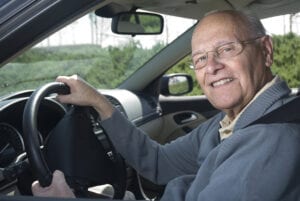Safe Driving in High-Risk Older Adults
 Almost half of drivers on the road today are over the age of 65, and experts expect that number to increase to 77% within 30 years. That has caused concern and discussion amongst public health safety experts. Adults over the age of 65 have a higher crash rate per mile than any other age group. Driving requires a number of physical and cognitive skills that can be affected by medications and age-related deterioration, including:
Almost half of drivers on the road today are over the age of 65, and experts expect that number to increase to 77% within 30 years. That has caused concern and discussion amongst public health safety experts. Adults over the age of 65 have a higher crash rate per mile than any other age group. Driving requires a number of physical and cognitive skills that can be affected by medications and age-related deterioration, including:
- Vision
- Hearing
- Motor reflexes
- Coordination
- Strength
- Memory
- Attention
Many older drivers are aware of these dangers, and take appropriate precautions to ensure that they operate the vehicle safely. However, there is growing concern over unsafe driving in individuals with dementia, or those who may be unaware of changes in their driving abilities.
Regular professional driving assessments can offer peace of mind to older adults and their family members. It’s reassuring to know that physical or mental changes that may affect their ability to drive safely can be identified early and catastrophe averted. Seniors who have been diagnosed with medical conditions known to impact safe driving are especially urged to take advantage of one of these valuable assessments. Conditions known to impact driving ability include, but aren’t limited to:
- Visual impairments
- Dementia
- Diabetes
- Seizures
- Sleep disorders
- Stroke
- Amputations
- Spinal cord injury
- Cardiovascular disease
- Arthritis
- Mental health diagnoses
Other warning signs that indicate an assessment is in order include:
- Near misses or fender benders
- Concerns or comments from friends, family members or medical providers
Driving Skill Evaluations
Organizations such as the AAA offer driving skill evaluations, which can help people identify any weaknesses or concerns about driving safety. Driving skill evaluators don’t deal directly with medical concerns, but rather focus on the individual’s ability to drive defensively, follow traffic laws, and take actions to minimize risks on the roadway. Depending on the outcome of the evaluation, recommendations may include:
- Simple adaptations to make driving easier or safer.
- Specialized supplemental training on safe driving techniques for seasoned drivers.
- In-depth clinical driving assessment with an occupational therapist.
- No further action.
Clinical Driving Assessments
Occupational therapists are highly trained medical specialists. They focus on understanding the challenges facing people with medical conditions, and how to help them reach their goals in spite of them. Occupational therapists are the best option for driving safety assessments if the senior struggles with dementia, history of stroke, arthritis or other physical or mental health problems.
When occupational therapists perform clinical driving assessments, they can recommend a wide variety of adaptations, vehicle modifications or specialized training. They are the very best resources for surmounting challenges facing senior drivers. They work with the individual to create an in-depth safe-driving plan, if there is any way possible to do so. Seniors can talk to their doctor about how to arrange an occupational therapy driving assessment.
Elder Care can Support Seniors who no Longer Drive
One major reason seniors can be hesitant to stop driving is that they may be unaware of transportation alternatives. For example, elder care services can offer assistance with shopping, errands, appointment transportation on a highly individualized basis. Nothing like calling a taxi, having an elder care aide is much more akin to having a personal assistant. Elder care aides provide a unique service for seniors who are facing the challenges of aging with courage and dignity, enabling them to live independently and according to their own personal preferences.
Sources
https://www.sciencedaily.com/releases/2016/07/160706091608.htm
https://seniordriving.aaa.com/evaluate-your-driving-ability/professional-assessment/
If you or an aging loved one is considering home care in Plainsboro, NJ, please contact the caring staff at Care Street Home Care today. Call (732) 607-8870.
- Signs Your Senior Parent Needs Home Care Assistance - January 17, 2025
- Hearing Rehabilitation: Empowering Seniors for Better Living - January 10, 2025
- Understanding How Cartilage Changes Over the Years - January 3, 2025
